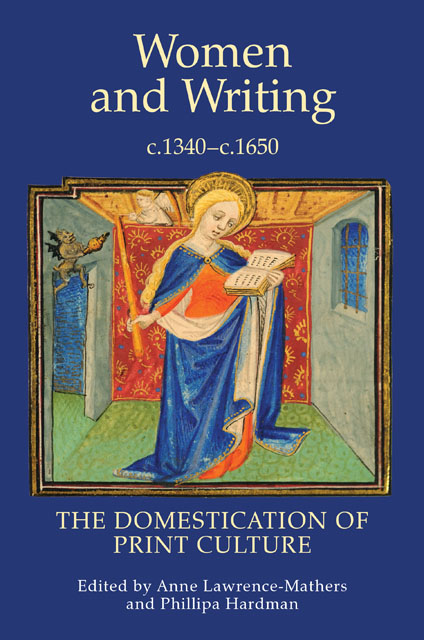Book contents
- Frontmatter
- Contents
- List of Plates
- List of Contributors
- Abbreviations
- Introduction
- Domestic Learning and Teaching: Investigating Evidence for the Role of ‘Household Miscellanies’ in Late-Medieval England
- Domesticating the Calendar: The Hours and the Almanac in Tudor England
- ‘a briefe and plaine declaration’: Lady Anne Bacon’s 1564 Translation of the Apologia Ecclesiae Anglicanae
- Frances Wolfreston’s Chaucer
- Commonplace Book Culture: A List of Sixteen Traits
- Women, Politics and Domesticity: The Scribal Publication of Lady Rich’s Letter to Elizabeth I
- ‘yr scribe can proove no nessecarye consiquence for you’?: The Social and Linguistic Implications of Joan Thynne’s using a Scribe in Letters to her Son, 1607–11
- Fathers and Daughters: Four Women and Their Family Albums of Verse
- The Book as Domestic Gift: Bodleian MS Don. C. 24
- ‘like hewen stone’: Augustine, Audience and Revision in Elizabeth Isham’s ‘Booke of Rememberance’ (c. 1639)
- Female Voices in Early Seventeenth Century Pamphlet Literature
- Select bibliography
- Index
- Misscellanious Endmatter
Women, Politics and Domesticity: The Scribal Publication of Lady Rich’s Letter to Elizabeth I
Published online by Cambridge University Press: 01 March 2023
- Frontmatter
- Contents
- List of Plates
- List of Contributors
- Abbreviations
- Introduction
- Domestic Learning and Teaching: Investigating Evidence for the Role of ‘Household Miscellanies’ in Late-Medieval England
- Domesticating the Calendar: The Hours and the Almanac in Tudor England
- ‘a briefe and plaine declaration’: Lady Anne Bacon’s 1564 Translation of the Apologia Ecclesiae Anglicanae
- Frances Wolfreston’s Chaucer
- Commonplace Book Culture: A List of Sixteen Traits
- Women, Politics and Domesticity: The Scribal Publication of Lady Rich’s Letter to Elizabeth I
- ‘yr scribe can proove no nessecarye consiquence for you’?: The Social and Linguistic Implications of Joan Thynne’s using a Scribe in Letters to her Son, 1607–11
- Fathers and Daughters: Four Women and Their Family Albums of Verse
- The Book as Domestic Gift: Bodleian MS Don. C. 24
- ‘like hewen stone’: Augustine, Audience and Revision in Elizabeth Isham’s ‘Booke of Rememberance’ (c. 1639)
- Female Voices in Early Seventeenth Century Pamphlet Literature
- Select bibliography
- Index
- Misscellanious Endmatter
Summary
This essay studies a single letter by Penelope, Lady Rich (1563–1607) as a means of examining the roles that early modern women played in scribal publication and Elizabethan court politics. Written in the aftermath of the earl of Essex’s disgrace in 1599, the letter interceded with Queen Elizabeth on her brother’s behalf. It came in the wake of a series of epistolary solicitations for royal clemency which flowed from Penelope Rich’s pen, a performance of sisterly duty. In this manner, the letter highlights the intersection of ‘domestic’ and ‘political’ spheres during the sixteenth and seventeenth centuries, and particularly the ways in which upper-class women were inevitably drawn into a world of high politics through performing conventional familial tasks. Yet Lady Rich’s letter differed in several important aspects from its predecessors. First, because of its notoriety: the strong tone offended the queen, who was angered by the letter’s defence of Essex, its castigation of his enemies, and above all by criticisms of the royal person for refusing to receive the earl. Indeed, Lady Rich’s epistle caused a great stir among court gossips, and was the subject of discussion during Essex’s later trial. A seemingly ‘private’ correspondence with the queen was in actual fact made highly ‘public’ for political, even propagandist purposes, and it attains added interest because of the complex ways in which it circulated. Surviving in over thirty variant manuscript versions, it represents one of the most widely scribally disseminated Elizabethan texts, rivalling Leicester’s commonwealth and Philip Sidney’s A letter to Queen Elizabeth. Lady Rich’s letter thus had a textual afterlife that existed alongside its initial presentation; it was also published in printed form along with Essex’s Apologie (1600), which perhaps hastened or confirmed its place within the scribal network.
The sophistication of this text and its scribal status raise important issues which this essay seeks to examine about the very nature of women’s letters, which are often viewed as quintessentially domestic, private and singular. It also reveals the complexities of early modern authorship and female subjectivity, since the circulation of the letter and subsequent textual and scribal variations distanced it from a simplistic notion of a two-way epistolary exchange.
- Type
- Chapter
- Information
- Women and Writing, c. 1340-c. 1650The Domestication of Print Culture, pp. 111 - 130Publisher: Boydell & BrewerPrint publication year: 2010



